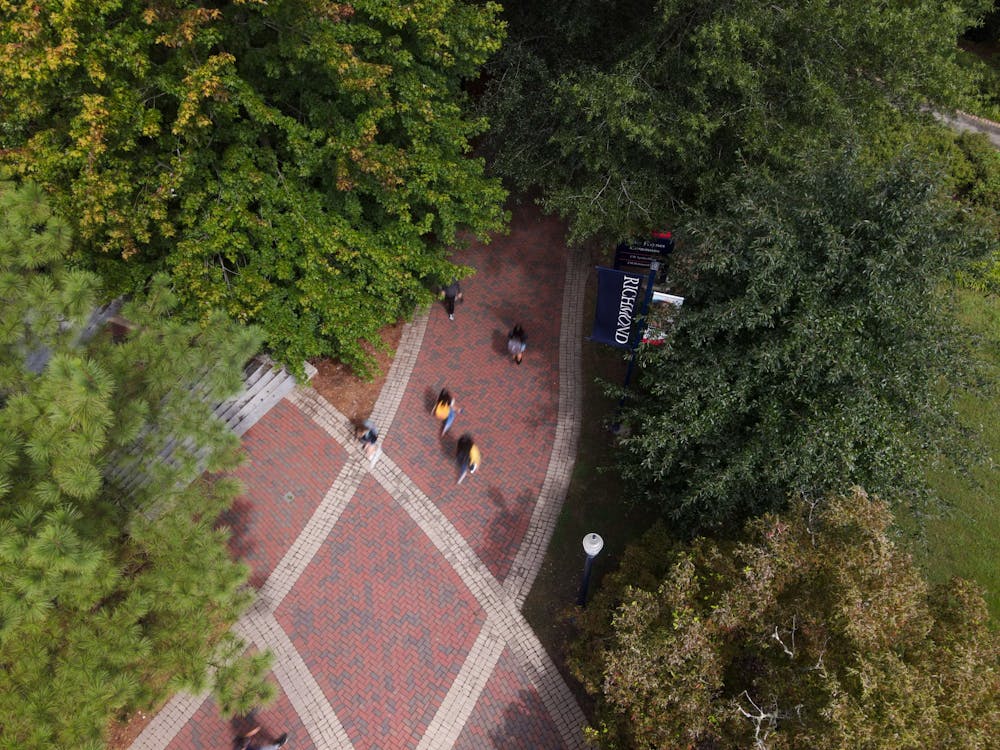This fall at the University of Richmond, professors can request that students wear masks in class, but hybrid teaching is no longer an option for the first time since the start of the COVID-19 pandemic.
Based on advice from the faculty senate, hybrid teaching has been discouraged by administrators this semester. They believe Zoom classes lead to more absences and less engagement, said Jeffrey Legro, executive vice president and provost.
“We have found that it degrades the quality of teaching in the class as teachers are trying to teach two different audiences [online and in-person],” he said.
UR's administration is no longer providing professors with Zoom capabilities in classrooms, said Peter Lurie, an English professor.
“We think there are better ways than hybrid to keep students up to date on classes they miss that don’t disrupt the main class,” Legro said.
He added that this is not an absolute rule: “We don’t say professors can’t use Zoom in particular circumstances."
Senior Sarah Murtaugh tested positive for COVID-19 on Sept. 16 and spent seven days in the quarantine pods near Lora Robins Court, she said.
Murtaugh did not have the option to Zoom into classes, which she said caused her a lot of stress.
“I had a history class I was really hoping not to miss, but I couldn’t Zoom in and the professor didn’t have any class recordings,” she said. “It caused a lot of anxiety of like, ‘Am I going to be able to catch up after I get out?’”
Luckily, Murtaugh said she was able to get back on track with school work fairly quickly.
"I have a light class schedule, but it would be tough if you had a harder schedule,” she said.
Masks are not required in any spaces on campus except for instructor, staff or student requests in private spaces such as students’ rooms, classrooms or offices, Legro said.
Enjoy what you're reading?
Signup for our newsletter
Additionally, professors are no longer notified by the school if a student in their class tests positive for COVID-19. It is up to students to notify their professors if they are a close contact or test positive, Legro said.
The decision of whether to request masks in classes is then entirely up to each professor, he said.
“There is no hard and fast rule because just because someone was in the class with COVID doesn’t mean other people have been exposed,” Legro said.
Lurie has asked students in his classes to wear masks once so far this semester because of a close contact.
“Essentially, I want to be safe like everyone,” Lurie said. “We’re not post-COVID. Many people have had it, and having had it doesn’t mean you won’t get it again.”
If a professor is identified as a close contact, they will be advised to wear a mask in indoor spaces on campus. Students always have the option to wear a mask in class, Legro said.
“The best protection for COVID is for you to personally wear a mask,” he said. “If you are worried about COVID and you wear a good mask, you are in pretty good shape.”
Rather than operating an official COVID-19 dashboard this semester, which is no longer available on the webpage, UR shares a Spider Health Report with community members via SpiderBytes every Friday morning.
As of Sept. 29, there were 15 active cases on campus, according to the report.
Sophomore Melissa Chaparro has not had any of her professors ask her to wear a mask to class, she said.
“When I look at the campus as a whole, I feel like barely any people are masking,” she said.
Chaparro, a student in the Gottwald Center for the Sciences, said a lot more people wore masks there than elsewhere on campus.
Chapparo added that she preferred the flexibility of the Green Stage in UR’s Physical Distancing Framework and its emphasis on post-COVID-19 normalcy.
“I like seeing more than just people’s eyes,” she said. “I know I have been doing way better in classes this year.”
UR's administration doesn't have a uniform policy because different people have varying levels of COVID-19 risks and fear, Legro said.
“It’s not uniform because we want a lot of flexibility for different people’s situations,” Legro said. “It allows people to work most comfortably now, and that is kind of what we’re aiming for.”
Contact news writer Anna Ridilla at anna.ridilla@richmond.edu.
Support independent student media
You can make a tax-deductible donation by clicking the button below, which takes you to our secure PayPal account. The page is set up to receive contributions in whatever amount you designate. We look forward to using the money we raise to further our mission of providing honest and accurate information to students, faculty, staff, alumni and others in the general public.
Donate Now



